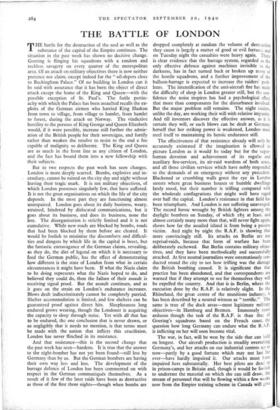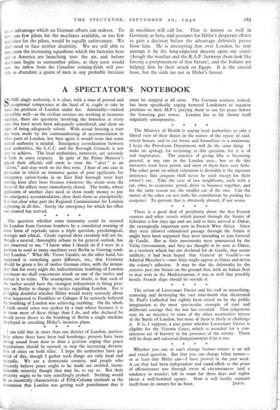THE BATTLE OF LONDON
THE battle for the destruction of the soul as well as the substance of the capital of the Empire continues. The situation in the past week has shown no decisive change. Goering is flinging his squadrons with a random and reckless savagery on every quarter of the metropolitan area. Of an attack on military objectives there is now neither pretence nor claim, except indeed for the " oil-depots close to Buckingham Palace." Of no building in London can it be said with assurance that it has been the object of direct attack except the home of the King and Queen—with the possible exception of St. Paul's. The futile pertin- acity with which the Palace has been assaulted recalls the ex- ploits of the German airmen who harried King Haakon from town to village, from village to hamlet, from hamlet to forest, during the attack on Norway. The vindictive hostility to the persons of King George and Queen Elizabeth would, if it were possible, increase still further the admir- ation of the British people for their sovereigns, and fortify rather than weaken the resolve to resist to the end a foe capable of malignity so deliberate. The King and Queen are as much in the front line as any citizen of London, and the fact has bound them into a new fellowship with their subjects.
But in two respects the past week has seen changes. London is more deeply scarred. Bombs, explosive and in- cendiary, cannot be rained on the city day and night without leaving their tragic mark. It is not military objectives, of which London possesses singularly few, that have suffered. It is not the great organisations on which the life of the city depends. In the most part they are functioning almost unimpaired. London goes about its daily business, weary, strained, hindered by dislocated communications, but it goes about its business, and does its business, none the less. The disorganisation is strictly limited and it is not cumulative. While new roads are blocked by bombs, roads that had been blocked by them before are cleared. It would be foolish to minimise the discomforts and difficul- ties and dangers by which life in the capital is beset, but the fantastic extravagance of the German claims, revealing, as they do, the diet of legend on which it is necessary to feed the German public, has the effect of demonstrating how different is the state of London from what in certain circumstances it might have been. If what the Nazis claim to be doing represents what the Nazis hoped to do, and believed they could do, then the failure of their assault is receiving signal proof. But the assault continues, and as it goes on the strain on London's endurance increases. Blows dealt indiscriminately cannot be completely parried. Shelter accommodation is limited, and few shelters can be guaranteed proof against direct hits. Sleeplessness long endured grows wearing, though the Londoner is acquiring the capacity to sleep through noise. Yet with all that has to be endured, the one conclusion that is never drawn, or so negligibly that it needs no mention, is that terms must be made with the nation that inflicts this crucifixion. London has never flinched in its resistance.
And that resistance--this is the second change that the past week has seen—hardens. It is true that the answer to the night-bomber has not yet been found—still less by Germany than by us. But the German bombers are having their own way less and less. The development of the barrage defence of London has been commented on with respect in the German communiqués themselves. As a result of it few of the later raids have been as destructive as those of the first three nights—though when bombs are dropped completely at random the volume of destruction they cause is largely a matter of good or evil fortune, and on Tuesday night the casualties were heavy again. There is clear evidence that the barrage system, regarded as the only effective defence against machines invisible in the darkness, has in fact turned back or broken up many of the hostile squadrons, and a further improvement of the balloon-barrage is expected to increase the raiders' prob- lems. The intensification of the anti-aircraft fire has made the difficulty of sleep in London greater still, but the con- fidence the noise inspires has had a psychological effect that more than compensates for the disturbance involved. But the major problem still remains. The night raiders, unlike the day, are working their will with relative impunity. And till inventors discover the effective answer, as it is certain they will, or such blows can be dealt at Germany herself that her striking power is weakened, London must steel itself to maintaining its heroic endurance still.
The effectiveness of that resistance already will only be accurately estimated if the imagination is allowed to picture London as it would be today but for the super- human devotion and achievement of its regular and auxiliary fire-services, its air-raid wardens of both sexes, and all those civilian services which have nobly responded to the demands of an emergency without any precedent. Blackened or crumbling walls greet the eye in London streets where great business houses or humble dwellings lately stood, but their number is trifling compared with the wholesale conflagrations that might well have raged over half the capital. London's resistance in that field has been triumphant. And London is not suffering unavenged. The record havoc wrought by British fighters among the daylight bombers on Sunday, of which 185 at least. and almost certainly many more than that, will never fight again, shows how far the assailed island is from being a passive victim. And night by night the R.A.F. is showing that more convincingly still. Its attacks on Berlin are not reprisal-raids, because that form of warfare has been deliberately eschewed. But Berlin contains military objec- tives, and they have been methodically and successfully attacked. At first neutral journalists were ostentatiously con- ducted round the city to see how trifling was the damage the British bombing caused. It is significant that that practice has been abandoned, and that correspondents are warned that if they attempt to see for themselves they will be expelled the country. And that is in Berlin, where the execution done by the R.A.F. is relatively slight. In the Rhineland, the great centre of the munitions industry, it has been described by a neutral witness as " terrific." The same is true of the dock areas—most legitimate military objectives—in Hamburg and Bremen. Immensely more arduous though the task of the R.A.F. is than that of Goering's squadrons based on the French coast, the question how long Germany can endure what the R.A•F• is inflicting on her will soon become vital.
The war, in fact, will be won by the side that can hold on longest. Our aircraft production is steadily overtaking Germany's, and her attacks on our industrial centres up to now—partly by a good fortune which may not last for ever—have hardly impaired it. Our attacks must have impaired hers substantially. Her best pilots are dead or in prison-camps in Britain and, though it would be foolish to underrate the material on which she can still draw, the stream of personnel that will be flowing within a few weeks now from the Empire training scheme in Canada will give us an advantage which no German efforts can redress. To have too few pilots for the machines available, or too few machines for the pilots, would be equally unfortunate. We shall need to face neither disability. We are still able to man even the increasing squadrons which the factories here and in America are launching into the air, and before machines begin to outnumber pilots, as they soon would now, the inflow from the Canadian training-fields will pro- vide as abundant a quota of men as any probable increase in machines will call for. That is known as well in Germany as here, and accounts for Hitler's desperate efforts to gain a decision before the advantage definitely passes from him. He is attempting that over London, he may attempt it by the long-expected descent upon our coasts (though the weather and the R.A.F. between them look like forcing a postponement of that fixture), and the Italians are helping him by their attack on Egypt. It is the crucial hour, but the odds are not in Hitler's favour.



























 Previous page
Previous page